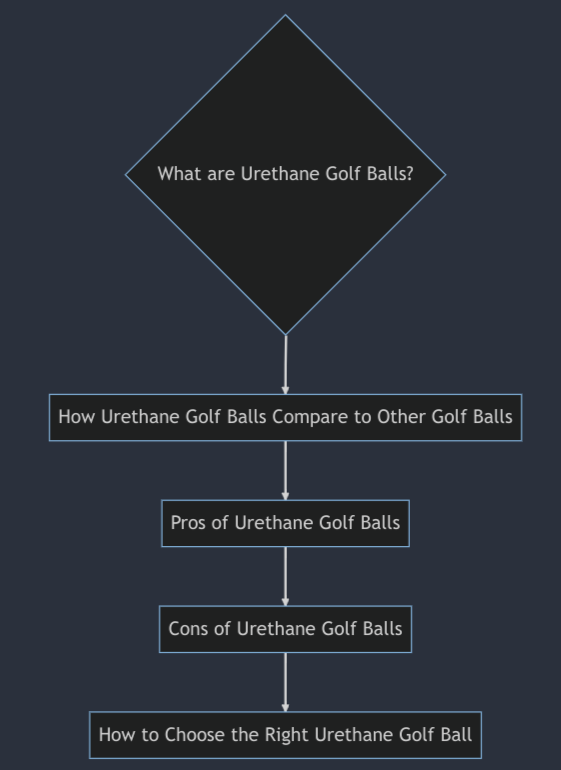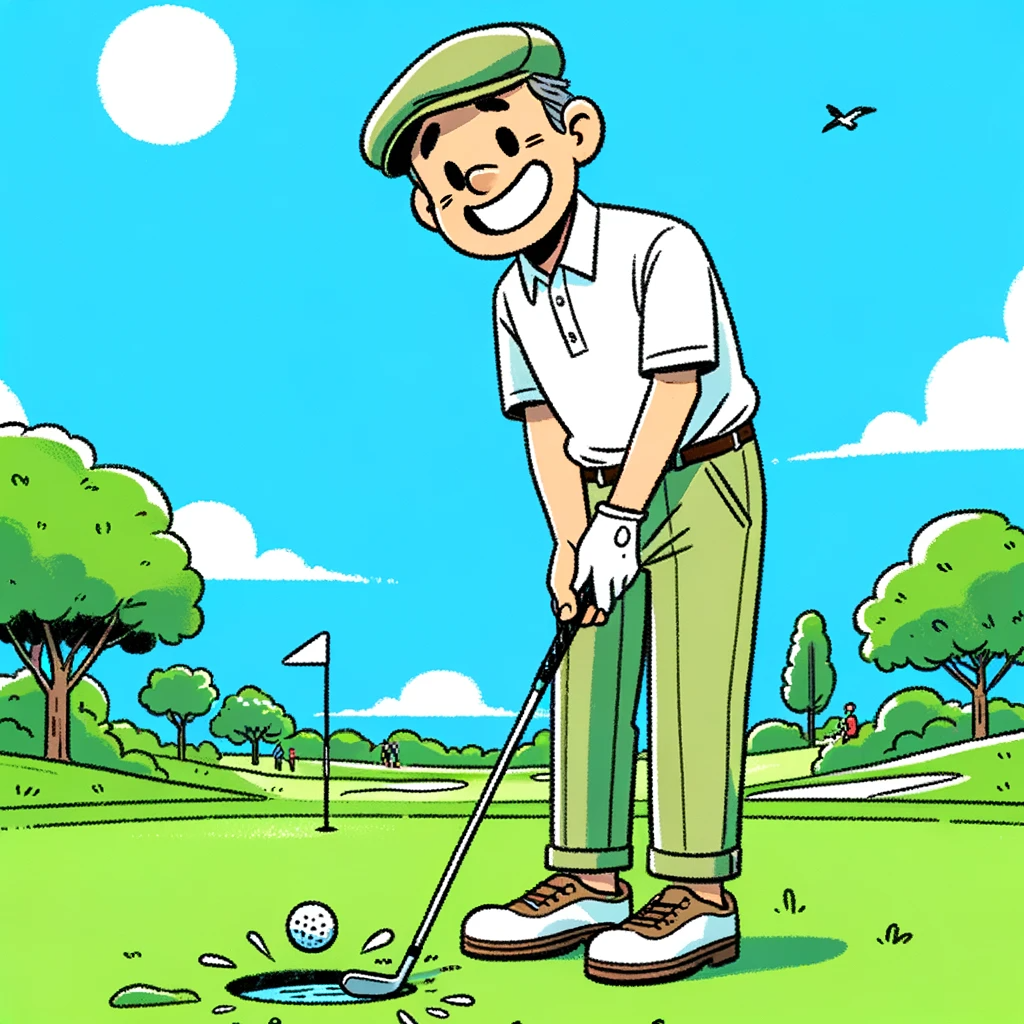- Home
- Equipment
- Golf Balls
- Are Urethane Golf Balls Better
Are Urethane Golf Balls Better? Pros and Cons of Urethane Golf Balls
Do you want to know whether urethane golf balls are better than other golf balls for your game?
Are you tired of constantly switching between golf balls in the hopes of finding the right one for you? Urethane golf balls have become increasingly popular among golfers of all skill levels, but are they the right choice for you? In this article, we will explore the pros and cons of urethane golf balls to help you make an informed decision about which golf ball is right for you.
Discover the benefits of using urethane golf balls, including increased spin control and better feel around the greens. We'll also discuss the potential drawbacks, such as higher cost and decreased durability. By the end of this article, you'll have a clear understanding of whether urethane golf balls are the right choice for your game.
Read on to find out whether urethane golf balls are the right choice for you and improve your game today!
Choosing the Right Urethane Golf Balls
As an inconsistent golfer who is always searching for ways to improve my game, I know firsthand the importance of choosing the right golf ball. In the past, I struggled to hit the ball consistently and was always searching for a solution to improve my game. It wasn't until I discovered the benefits of urethane golf balls that I finally found the key to unlocking my potential on the course.
Let me take you back to a time when I was struggling on the course, hitting inconsistent shots that never seemed to go where I wanted them to. I tried every ball on the market, but nothing seemed to work. It was frustrating, and I was ready to give up. But then I heard about urethane golf balls and decided to give them a try.
The first time I used a urethane golf ball, I was amazed at the difference it made in my game. The ball was softer and more responsive, allowing me to hit longer, straighter shots with greater control. It was a game-changer for me, and I've been using urethane balls ever since.
In this article, I want to share with you everything you need to know about urethane golf balls. We'll discuss the pros and cons of using them, the differences between urethane and other types of golf balls, and how to choose the right urethane ball for your game.
So, if you're ready to take your game to the next level, let's dive in and explore the world of urethane golf balls.
What are Urethane Golf Balls?
If you're not a golf geek like me, you might be wondering, "what the heck are urethane golf balls?" Don't worry, I had the same question when I first started playing.
Back in the day, when I was just starting out as a golfer, I was convinced that the key to success was using the most expensive golf balls I could find. I thought that if I spent more on my equipment, I would automatically become a better golfer.
So, I invested in some pricey golf balls made with a synthetic material called Surlyn. I assumed they would help me improve my game, but instead, I was left feeling frustrated and disappointed. My shots just didn't have the same spin and control that I was looking for.
That's when I learned about urethane golf balls. These golf balls are made with a softer, more responsive material than Surlyn, which allows for better feel and control on the green. Plus, they offer more spin and better overall performance.
So, what exactly are urethane golf balls?
In short, they are a type of golf ball that is made with a urethane cover instead of the harder Surlyn material. The cover is typically thinner and softer, which allows for more feel and spin around the greens.
Now that we've covered the basics, let's take a closer look at what makes urethane golf balls so special.
How Urethane Golf Balls Compare to Other Golf Balls
As someone who has spent a lot of time on the golf course, I've tried my fair share of golf balls. Yes, I’ve bought many expensive balls and I’ve also played with a lot of garbage…
I remember when I first started playing, I used to just pick up whatever balls I found on the course, not really paying attention to what type they were. But as I got more serious about my game, I realized that the right golf ball can make a huge difference in my performance.
So what sets urethane golf balls apart from other types of golf balls?
Let me break it down for you.
First off, there are two-piece and three-piece golf balls. Two-piece golf balls are typically made of a large solid core with a hard outer layer. They're known for their distance and durability, but can lack the feel and spin control that more advanced golfers are looking for. Three-piece golf balls, on the other hand, have a softer core, a middle layer for added distance, and a softer outer layer for better spin control. They're generally more expensive than two-piece balls, but can offer more control and feel around the greens.
Urethane golf balls are typically three-piece balls, but with a urethane cover instead of a harder outer layer. This urethane cover gives the ball a softer feel and more spin control than traditional two-piece balls, while still offering the distance and durability you expect from a three-piece ball. Urethane balls are often used by more advanced golfers who are looking for the best possible performance on the course.
Of course, with that increased performance comes a higher price tag. Urethane golf balls are generally more expensive than other types of golf balls, so they may not be the best option for beginners or high-handicap golfers who are still working on their game. But for those who are looking to take their game to the next level, urethane balls are definitely worth considering.
So, now that you know the basics of urethane golf balls and how they compare to other types of golf balls, let's dive a little deeper into why they might be the right choice for you.
Pros of Urethane Golf Balls
When it comes to choosing the right golf ball, the pros of using urethane golf balls can make all the difference. As someone who has struggled with choosing the right golf ball for years, I can attest to the benefits of using urethane golf balls.
In the past, I would often use cheap, two-piece golf balls because I thought they were good enough for my skill level. However, I soon realized that my game was suffering because of my choice of golf ball. I wasn't getting the distance or spin control I needed to play my best.
That's when I decided to try urethane golf balls, and I was blown away by the difference they made in my game. With their soft feel and improved spin control, I was able to make shots that I never thought were possible before.
But it's not just me who has experienced the benefits of using urethane golf balls. Professional golfers swear by them, and it's easy to see why. Urethane golf balls provide the optimal combination of distance, spin control, and feel, making them a great choice for golfers of all skill levels.
So, if you're looking to improve your game and take your skills to the next level, I highly recommend giving urethane golf balls a try. You won't be disappointed!
Cons of Urethane Golf Balls
Let's talk about the potential downsides of using urethane golf balls. While there are plenty of advantages, there are a few cons to consider as well.
One of the most common concerns is the higher cost of urethane golf balls compared to other types of golf balls. And let me tell you, as someone who has lost their fair share of golf balls to the water hazards, it can be tough to justify the extra expense.
Another downside to urethane golf balls is their shorter lifespan. Due to their softer composition, they are more prone to damage from high-speed impacts and can scuff or cut more easily. However, proper ball care can help extend their life and prevent unnecessary wear and tear.
There are also some misconceptions about urethane golf balls that need to be addressed. For example, some people believe that they are only suitable for high-level players, but that's not necessarily true. While they do offer certain advantages, golfers of all skill levels can benefit from using urethane golf balls.
So, while there are some downsides to consider, I still believe that the pros of urethane golf balls outweigh the cons. It's all about finding the right balance between performance and budget, and choosing the ball that works best for your game.
How to Choose the Right Urethane Golf Ball
Alright folks, it's time to talk about the most important aspect of choosing the right golf ball: your personal preference. Yes, you heard me right - your preference. Choosing the right golf ball can be a daunting task, especially if you're a beginner. But don't worry, I'm here to help.
When it comes to choosing the right urethane golf ball, there are a few factors you need to consider. The first and foremost is your swing speed. If you have a slower swing speed, you'll want a softer urethane golf ball, as it will help you generate more distance. On the other hand, if you have a faster swing speed, you'll want a harder urethane golf ball to help control your shots.
Another factor to consider is your skill level. If you're a beginner, you might want to opt for a lower-priced urethane golf ball until you improve your skills. If you're an advanced player, you might want to invest in a high-quality urethane golf ball that will give you more control over your shots.
But, let me tell you a little secret. The truth is, the only way to find the perfect urethane golf ball for you is to try out different brands and models. I know, I know - it can be expensive to try them all out. But trust me, it's worth it in the long run.
Personally, I struggled with choosing the right golf ball for years. I went through countless brands and models, trying to find the perfect one for me. But then I realized that there is no one perfect golf ball - it all comes down to personal preference.
Now, I use a soft urethane golf ball that helps me generate more distance, but also gives me great control over my shots. And you know what? I love it. It might not be the right ball for everyone, but it's the right ball for me.
So, my advice to you is to try out different urethane golf balls and see which one feels best for you. Don't be afraid to invest a little extra money in a higher quality ball if it will improve your game. And most importantly, have fun out there on the course.
With that, let's move on to the last section of our article…
 The Ultimate Guide to Urethane Golf Balls: How They Compare to Other Balls, Pros and Cons, and How to Choose the Right One for You
The Ultimate Guide to Urethane Golf Balls: How They Compare to Other Balls, Pros and Cons, and How to Choose the Right One for YouConclusion
Alright, folks, we've covered a lot of ground here. Let's quickly recap what we've learned about urethane golf balls.
Pros:
- Urethane golf balls offer better spin control, greater distance, and improved feel
- Many professional golfers use them
Cons:
- They can be more expensive than other types of golf balls
- They may have a shorter lifespan
Now, you might be wondering whether urethane golf balls are worth the extra cost, especially for weekend golfers like myself. Here's my take on it.
If you're just starting out or have a slower swing speed, you might not notice a significant difference between urethane balls and other types of golf balls. However, if you're a more experienced golfer with a faster swing speed, you may benefit from the performance advantages that urethane balls offer.
Ultimately, it comes down to personal preference and budget. If you're willing to spend a little extra money for improved performance, go for it. But if you're happy with your current golf ball and don't want to break the bank, stick with what you know.
In the end, the most important thing is to have fun out on the course. Whether you're using urethane balls or not, golf is a great way to unwind and enjoy the outdoors. And as for me? Well, let's just say that thanks to urethane balls, my game has improved significantly. And that, my friends, is a hole in one.
Frequently Asked Questions (FAQ) about Urethane Golf Balls
What is a urethane golf ball?
What is a urethane golf ball?
A urethane golf ball is a type of golf ball that has a cover made from urethane material. It is known for its soft feel, increased spin, and better control.
What is the difference between urethane golf balls and other types of golf balls?
What is the difference between urethane golf balls and other types of golf balls?
Urethane golf balls have a soft cover made from urethane material, which gives them better spin control and feel than other types of golf balls. They also tend to be more expensive and have a shorter lifespan than other types of golf balls.
What are the pros of using urethane golf balls?
What are the pros of using urethane golf balls?
Urethane golf balls offer better spin control, greater distance, and improved feel compared to other types of golf balls. They are also preferred by professional golfers for their performance and accuracy.
What are the cons of using urethane golf balls?
What are the cons of using urethane golf balls?
Urethane golf balls are typically more expensive and have a shorter lifespan than other types of golf balls. They can also be more susceptible to damage, especially on harder surfaces.
What factors should I consider when choosing a urethane golf ball?
What factors should I consider when choosing a urethane golf ball?
When choosing a urethane golf ball, consider factors such as your swing speed, skill level, and personal preferences. Higher swing speeds may require a firmer ball, while lower swing speeds may benefit from a softer ball. Additionally, certain golf ball models may be better suited for certain skill levels or playing styles.
What are some recommended urethane golf balls for different types of golfers?
What are some recommended urethane golf balls for different types of golfers?
For high swing speeds and advanced players, the Titleist Pro V1 or Pro V1x, TaylorMade TP5 or TP5x, or Callaway Chrome Soft X are all popular choices. For lower swing speeds and beginners, the Titleist NXT Tour or NXT Tour S, Bridgestone e6 Soft, or Srixon Q-Star Tour are all good options.
Are urethane golf balls worth the extra cost for weekend golfers?
Are urethane golf balls worth the extra cost for weekend golfers?
It depends on your personal preferences and budget. If you prioritize performance and accuracy in your golf game and are willing to spend more for a better golf ball, then urethane golf balls may be worth the investment. However, if you are on a tighter budget or prioritize other aspects of your golf game, then a less expensive golf ball may be a better fit for you.

























